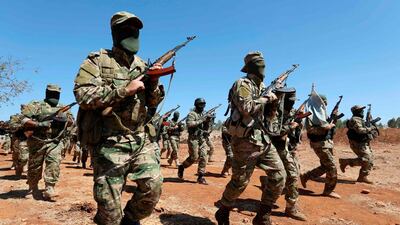A notorious Iraqi extremist leader was killed in a suicide bombing in Syria's rebel-held north-west, it was revealed on Friday.
Abu Maria Al Qahtani was killed in an attack by an ISIS fighter using an explosive belt, said former Al Qaeda affiliate Hayat Tahrir Al Sham, which rules Syria's last remaining rebel bastion, on its affiliated Amjad media outlet.
Al Qahtani, whose real name was Maysar Ali Musa Abdallah Al Juburi, "was killed and two of his companions seriously injured after a suicide bomber blew himself up", the UK-based Syrian Observatory for Human Rights said.
The war monitor, which has a network of sources in Syria, did not provide further details about the identity of the suicide bomber. No group has so far claimed responsibility for Al Qahtani's killing.
He was one of the founders of Al Nusra Front, a former Al Qaeda offshoot in Syria that later renamed itself Hayat Tahrir Al Sham.
The US designated Hayat Tahrir a terrorist organisation and the group has long been a target for Syrian government troops and Russian forces.
The group controls about half of Idlib province and parts of neighbouring Hama, Aleppo and Latakia.
Al Qahtani who fought against US forces following the invasion of Iraq in 2003. He moved to Syria after the 2011 uprising to join insurgents fighting against government troops.
He had been under US sanctions since 2012, with the Treasury accusing him of travelling to Syria in 2011 to spread Al Qaeda ideology, before occupying leading roles in Al Nusra Front.
He was killed shortly after being released from a Hayat Tahrir prison, where he had been detained for seven months on charges of collaborating with an enemy party, the war monitor said.
On March 7, the group acquitted and released Al Qahtani.
Hayat Tahrir competes with Turkey-backed mainstream rebel groups, which also control large parts of territory near the border in north-western Syria.
Syria has been ravaged by 13 years of civil war in which more than half a million people have been killed and millions more displaced.
MATCH INFO
Inter Milan 1 (Martinez 18' pen)
Juventus 2 (Dybala 4', Higuain 80')
MATCH INFO
Uefa Champions League semi-finals, second leg:
Liverpool (0) v Barcelona (3), Tuesday, 11pm UAE
Game is on BeIN Sports
COMPANY PROFILE
Name: Kumulus Water
Started: 2021
Founders: Iheb Triki and Mohamed Ali Abid
Based: Tunisia
Sector: Water technology
Number of staff: 22
Investment raised: $4 million
More from Rashmee Roshan Lall
What are NFTs?
Are non-fungible tokens a currency, asset, or a licensing instrument? Arnab Das, global market strategist EMEA at Invesco, says they are mix of all of three.
You can buy, hold and use NFTs just like US dollars and Bitcoins. “They can appreciate in value and even produce cash flows.”
However, while money is fungible, NFTs are not. “One Bitcoin, dollar, euro or dirham is largely indistinguishable from the next. Nothing ties a dollar bill to a particular owner, for example. Nor does it tie you to to any goods, services or assets you bought with that currency. In contrast, NFTs confer specific ownership,” Mr Das says.
This makes NFTs closer to a piece of intellectual property such as a work of art or licence, as you can claim royalties or profit by exchanging it at a higher value later, Mr Das says. “They could provide a sustainable income stream.”
This income will depend on future demand and use, which makes NFTs difficult to value. “However, there is a credible use case for many forms of intellectual property, notably art, songs, videos,” Mr Das says.
Know your Camel lingo
The bairaq is a competition for the best herd of 50 camels, named for the banner its winner takes home
Namoos - a word of congratulations reserved for falconry competitions, camel races and camel pageants. It best translates as 'the pride of victory' - and for competitors, it is priceless
Asayel camels - sleek, short-haired hound-like racers
Majahim - chocolate-brown camels that can grow to weigh two tonnes. They were only valued for milk until camel pageantry took off in the 1990s
Millions Street - the thoroughfare where camels are led and where white 4x4s throng throughout the festival
COMPANY%20PROFILE
%3Cp%3E%3Cstrong%3ECompany%3A%20%3C%2Fstrong%3EGrowdash%0D%3Cbr%3E%3Cstrong%3EStarted%3A%20%3C%2Fstrong%3EJuly%202022%0D%3Cbr%3E%3Cstrong%3EFounders%3A%20%3C%2Fstrong%3ESean%20Trevaskis%20and%20Enver%20Sorkun%0D%3Cbr%3E%3Cstrong%3EBased%3A%20%3C%2Fstrong%3EDubai%2C%20UAE%0D%3Cbr%3E%3Cstrong%3EIndustry%3A%20%3C%2Fstrong%3ERestaurant%20technology%0D%3Cbr%3E%3Cstrong%3EFunding%20so%20far%3A%3C%2Fstrong%3E%20%24750%2C000%0D%3Cbr%3E%3Cstrong%3EInvestors%3A%20%3C%2Fstrong%3EFlat6Labs%2C%20Plus%20VC%2C%20Judah%20VC%2C%20TPN%20Investments%20and%20angel%20investors%2C%20including%20former%20Talabat%20chief%20executive%20Abdulhamid%20Alomar%2C%20and%20entrepreneur%20Zeid%20Husban%3C%2Fp%3E%0A
MATCH INFO
Quarter-finals
Saturday (all times UAE)
England v Australia, 11.15am
New Zealand v Ireland, 2.15pm
Sunday
Wales v France, 11.15am
Japan v South Africa, 2.15pm
UAE currency: the story behind the money in your pockets
Terror attacks in Paris, November 13, 2015
- At 9.16pm, three suicide attackers killed one person outside the Atade de France during a foootball match between France and Germany
- At 9.25pm, three attackers opened fire on restaurants and cafes over 20 minutes, killing 39 people
- Shortly after 9.40pm, three other attackers launched a three-hour raid on the Bataclan, in which 1,500 people had gathered to watch a rock concert. In total, 90 people were killed
- Salah Abdeslam, the only survivor of the terrorists, did not directly participate in the attacks, thought to be due to a technical glitch in his suicide vest
- He fled to Belgium and was involved in attacks on Brussels in March 2016. He is serving a life sentence in France
ITU Abu Dhabi World Triathlon
World%20Cup%202023%20ticket%20sales
%3Cp%3EAugust%2025%20%E2%80%93%20Non-India%20warm-up%20matches%20and%20all%20non-India%20event%20matches%0D%3Cbr%3EAugust%2030%20%E2%80%93%20India%20matches%20at%20Guwahati%20and%20Trivandrum%0D%3Cbr%3EAugust%2031%20%E2%80%93%20India%20matches%20at%20Chennai%2C%20Delhi%20and%20Pune%0D%3Cbr%3ESeptember%201%20%E2%80%93%20India%20matches%20at%20Dharamsala%2C%20Lucknow%20and%20Mumbai%0D%3Cbr%3ESeptember%202%20%E2%80%93%20India%20matches%20at%20Bengaluru%20and%20Kolkata%0D%3Cbr%3ESeptember%203%20%E2%80%93%20India%20matches%20at%20Ahmedabad%0D%3Cbr%3ESeptember%2015%20%E2%80%93%20Semi-finals%20and%20Final%3C%2Fp%3E%0A
ABU%20DHABI'S%20KEY%20TOURISM%20GOALS%3A%20BY%20THE%20NUMBERS
%3Cp%3EBy%202030%2C%20Abu%20Dhabi%20aims%20to%20achieve%3A%3C%2Fp%3E%0A%3Cp%3E%3Cstrong%3E%E2%80%A2%2039.3%20million%20visitors%2C%3C%2Fstrong%3E%20nearly%2064%25%20up%20from%202023%3C%2Fp%3E%0A%3Cp%3E%3Cstrong%3E%E2%80%A2%20Dh90%20billion%20contribution%20to%20GDP%2C%3C%2Fstrong%3E%20about%2084%25%20more%20than%20Dh49%20billion%20in%202023%3C%2Fp%3E%0A%3Cp%3E%3Cstrong%3E%E2%80%A2%20178%2C000%20new%20jobs%2C%3C%2Fstrong%3E%20bringing%20the%20total%20to%20about%20366%2C000%3C%2Fp%3E%0A%3Cp%3E%3Cstrong%3E%E2%80%A2%2052%2C000%20hotel%20rooms%2C%3C%2Fstrong%3E%20up%2053%25%20from%2034%2C000%20in%202023%3C%2Fp%3E%0A%3Cp%3E%3Cstrong%3E%E2%80%A2%207.2%20million%20international%20visitors%2C%3C%2Fstrong%3E%20almost%2090%25%20higher%20compared%20to%202023's%203.8%20million%3C%2Fp%3E%0A%3Cp%3E%3Cstrong%3E%E2%80%A2%203.9%20international%20overnight%20hotel%20stays%2C%3C%2Fstrong%3E%2022%25%20more%20from%203.2%20nights%20in%202023%3C%2Fp%3E%0A

